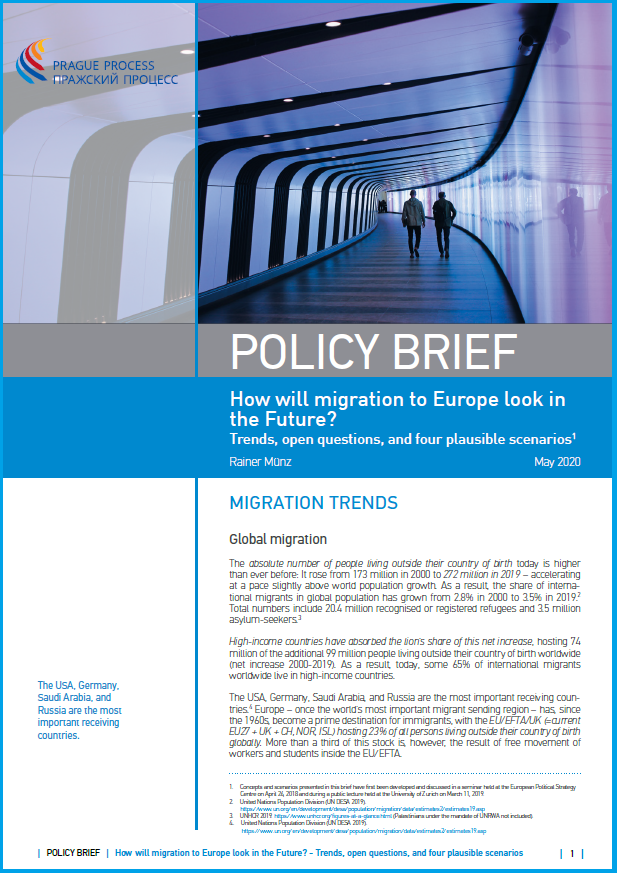The Prague Process Migration Observatory continues to release new publications. Today, we gladly present you the new policy brief "How will migration to Europe look in the Future? Trends, open questions and four plausible scenarios" authored by Prof. Rainer Münz, Former Adviser on Migration and Demography to President J.C.Juncker during his time in office (2014-2019), now JRC-KCMD.
The policy brief looks at the migration trends of the past 20 years, outlines open questions to be addressed by national migration policies and makes an attempt to set forward four plausible scenarios of how migration to Europe may look in the future. In doing so, the brief also considers the impact of the CoVid-19 pandemic on migration. The four scenarios envisage the following:
- ‘Back to the early 2000s’. Rights-based admissions would still play a more important role than labour migration so that many third-country nationals settling in Europe would likely not immediately join the labour market.
- Migration could be driven by the ‘Instability in the neighbourhood’. Scenario two assumes large-scale future population displacements affecting Europe.
- ‘More selective admission of immigrants’. This scenario assumes that shortages of labour and skills in a number of EU Member States could trigger major migration policy changes: a shift from present admission criteria to a stricter skills-based selection of labour migrants and/or to a more demand- and employer-driven selection.
- ‘Going native’. Scenario four assumes that migration policies become ever more restrictive, coupled with a general political consensus on such restrictions and a social climate in which migrants are not welcome.
To preview and download the brief please use this link.
Moreover, our Repository
- Policy brief by Ruslan Minich and Pavlo Kravchuk "The Impact of COVID-19 on Ukrainian Labour Migrants in Czechia, Hungary, Poland and Italy"
- Policy brief by Glen Hodgson "Intra-corporate Transferees (ICTs): The benefits for the EU and the opportunity cost"
- Policy brief by Kristof Tamas "Making the EU’s Migration and Development Policies More Coherent"
- Policy brief by Andriy Orlean "Countering Human Trafficking: Identifying, Returning and Assisting Victims from Ukraine"
- Policy brief by Olga Gulina "Russian nationals looking for refuge in the European Union"
- Policy brief by Dmitry Poletaev "Russia’s Migration Policies after the dissolution of the Federal Migration Service"
- Policy Brief by Yan Matusevich "The EU Central Asia Strategy and Its Impact on Migration"
- Policy brief by Kristof Tamas "Assessing the EU's External Migration Policy"
- Training Manual "How to be a good trainer?"
- Policy Brief by Nermin Oruc and Danica Santic "Highly-skilled Return Migrants to the Western Balkans: Should we count (on) them?"
- Analytical Report by Yelena Sadovskaya "China's "Belt and Road" Initiative and Its Impact on Migration Flows and Policies in Central Asia"
- Policy Brief by Petros Aghababyan "Closing the policy gaps concerning an eventual mass influx of asylum seekers to Armenia"
- Policy Brief by Yan Matusevich "Evaluating the Future of Uzbek Labour Migration"
- Analytical Report by Ivanka Heinzl "Report on the National Action Plan to Fight Trafficking in Human Beings of the Republic of Azerbaijan"
- Policy Brief by Haykanush Chobanyan "Assessing Armenia’s Migration Strategy for 2017-2021"
- Policy Brief by Natia Mestvirishvili "Circular Migration Schemes in Georgia"
- Policy Brief by Katerina Ivashchenko-Stadnik "Ukraine: First visa-free year since introducing the visa-free regime"

